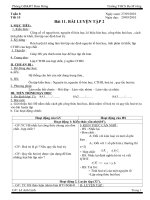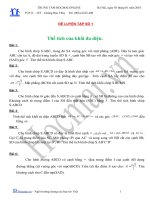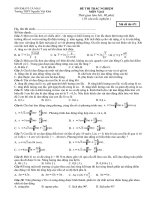đề luyện tập số 2 Anh văn
Bạn đang xem bản rút gọn của tài liệu. Xem và tải ngay bản đầy đủ của tài liệu tại đây (690.99 KB, 7 trang )
Sưu tầm và biên soạn: Nguyễn Nam Thịnh
ĐỀ LUYỆN TẬP SỐ 2
Mark the letter A, B, C or D on your answer sheet to indicate the word whose underlined part is
pronounced differently from that of the rest in each of the following questions.
Question 1: A. accurate
B. date
C. tale
D. shape
Question 2 : A. sounds
B. obstacles
C. situations
D. secrets
Mark the letter A, B, C or D on your answer sheet to indicate the word that differs from the rest in
the position of the main stress in each of the following questions.
Question 3: A. succeed
B. anxious
C. well-done
D. reduce
Question 4: A. studious
B. century
C. similar
D. semester
Mark the letter A, B, C or D on your answer sheet to indicate the sentence that is closest in meaning
to each of the following questions.
Question 5: “Leave my house now or I’ll call the police!” shouted the lady to the man.
A. The lady said she would call the police if the man didn’t leave her house.
B. The lady told the man that she would call the police he didn’t leave her house.
C. The lady informed the man that she would call the police if he didn’t leave her house.
D. The lady threatened to call the police if the man didn’t leave her house.
Question 6: He last has his eyes tested ten months ago.
A. He had tested his eyes ten months before.
B. He didn’t have any test on his eyes ten months before.
C. He had not tested his eyes for ten months then.
D. He hasn’t had his eyes tested for ten months.
Question 7: He survived the operation thanks to the skillful surgeon.
A. He survived because he was a skillful surgeon.
B. He wouldn’t have survived the operation without the skillful surgeon.
C. There was no skillful surgeon, so he died.
D. Though the surgeon was skillful, he couldn’t survive the operation.
Mark the letter A, B, C or D on your answer sheet to indicate the word(s) OPPOSITE in meaning to
the underlined word(s) in each of the following questions.
Question 8: My younger brothers are obedient most of the time, but they are quite mischievous
sometimes.
A. Naughty
B. hard-working
C. well-behaved
D. disruptive
Question 9: You should not wear casual clothes to the interview. The first impression is very
important.
A. New
B. informal
C. neat
D. formal
Mark the letter A, B, C or D on your answer sheet to indicate the word(s) CLOSEST in meaning to
the underlined word(s) in each of the following questions.
Question 10: In daily communication, you should know how to interpret other people’s body
language.
Lớp off:
Hotline: 0965 766 829
Cơ sở 1: Bình Phú – Thạch Thất – Hà Nội
Cơ sở 2: ngõ 44 – phố Pháo Đài Láng – Hà Nội
Page 1
Sưu tầm và biên soạn: Nguyễn Nam Thịnh
A. Understand
B. answer
C. respond
D. notice
Question 11: The purpose of this survey is to determine students’ attitudes toward love and marriage.
A. Find out
B. develop
C. concern
D. build
Read the following passage and mark the letter A, B, C, D on your answer sheet to indicate the
correct answer to each of the questions.
Face-to-face conversation is a two-way process: You speak to me, I reply to you and so on. Two-way
(12)_______ depends on having a coding system that is understood by both sender and (13)_______,
and an agreed convention about signaling the beginning and end of the message. In speech, the coding
system is the language like English or Spanish; the convention that one person speaks at a time may
seem too obvious to mention. In fact, the signals (14)_______ in conversation and meetings are often
(15)_______. For example, lowering the pitch of the voice may mean the end of a sentence, a sharp
intake of breath may signal the desire to interrupt, catching the chairman’s eye may indicate the desire
to speak in a formal setting like a debate, a clenched fist may indicate anger. When (16)_______ visual
signals are not possible, more formal signals may be needed.
Question 12: A. Exchange
B. Interchange
C.Communication
D.Correspondence
Question 13: A. Announcer
B. Receiver
C. Messenger
D. Transmitter
Question 14: A. That people use B. Are used
C. Using
D. Being used
Question 15: A. Informal
B. non-verbal
C. verbal
D. formal
Question 16: A. their
B. These
C. This
D. That
Mark the letter A, B, C or D on your answer sheet to indicate the correct answer to each of the
following questions.
Question 17: The state school system is free for all students and _______ by the government.
A. Is paid for
B. is paying for
C. pays for
D. is being pay for
Question 18: Jane got married_______ Peter two years ago, but now they have split
A. As
B. with
C. for
D. to
Question 19: The H5N1 infected patients have to _______ others to prevent the virus from spreading
A. Take care of B. get away
C. look after
D. stay away from
Question 20: Whenever I have problems, Jane is always very dependable. She never ______.
A. Turns up
B. let me down
C. turns me off
D. turns out
Question 21: Students are expected to write their homework slowly and _______.
A. Careless
B. carefully
C. carelessly
D. careful
Question 22: During the interview, you should try to ____ a good impression on your interview.
A. Create
B. have
C. give
D. try
Question 23: An academic year in Vietnam is divided _____ two terms
A. In
B. into
C. within
D. from
Question 24: Global warming is obviously _______ a worrying influence on the climate worldwide
A. Having
B. making
C. giving
D. taking
Question 25: He wanted to know whose car I borrowed _____
A. Yesterday
B. evening the last evening
Lớp off:
Hotline: 0965 766 829
Cơ sở 1: Bình Phú – Thạch Thất – Hà Nội
Cơ sở 2: ngõ 44 – phố Pháo Đài Láng – Hà Nội
Page 2
Sưu tầm và biên soạn: Nguyễn Nam Thịnh
C. last night
D. the previous night
Question 26: The man to _______ we have just talked is the Director General
A. Who
B. that
C. whom
D. 0
Question 27: Though built in 1946, computers were sold ______ for the first time in the 1950s
A. Commercial
B. commercialise C. commercially
D. commerce
Question 28: ______hard, you will get good results in the coming examination.
A. Should you work
B. unless you work
C. if you will work
D. if work
Mark the letter A, B, C, or D on your answer sheet to indicate the underlined part that needs
correction in each of the following questions.
Question 29: (A) If you take (B) the train, it (C) would be (D) much more convenient.
Question 30: (A) Some of his favourite (B) subjects at school (C) are Maths, English and (D)
Geographical.
Question 31: (A) Could you tell (B) me (C) how can I get to (D) the city library, please?
Mark the letter A, B, C or D on your answer sheet to indicate the sentence that best combines each
pairs of sentences in the following questions.
Question 32: They were rich; they didn’t have a happy family, though.
A. Although they were rich, but they didn’t have a happy family.
B. Rich though they were, they didn’t have a happy family.
C. They were rich although they didn’t have a happy family.
D. However they were rich, they didn’t have a happy family.
Question 33: One student failed because he completely ignored the instruction on the paper. The
instructions appeared on the top of every page.
A. One student failed because he completely ignored the instructions appearing on the top of every
page on the paper.
B. Even though one student ignored the instructions printed on the top of every paper, he failed.
C. One student failed to ignore the instructions printed on the top of every page of paper.
D. No matter how completely one student ignored the instructions printed on the top of every page of
the paper, he failed.
Mark the letter A, B, C or D on your answer sheet to indicate the most suitable response to complete
each of the following exchanges.
Question 34: Peter and Bob are talking about the plan for tonight.
Peter: “_________________.”
Bob: “I’d love to. Thank you.”
A. Would you like to go to the new coffee shop with me?
B. What would you do if you can afford a new car?
C. Would you like a cake?
D. Why do you spend so much time playing games?
Question 35: Two people are talking on the phone.
Lớp off:
Hotline: 0965 766 829
Cơ sở 1: Bình Phú – Thạch Thất – Hà Nội
Cơ sở 2: ngõ 44 – phố Pháo Đài Láng – Hà Nội
Page 3
Sưu tầm và biên soạn: Nguyễn Nam Thịnh
A: “Could I speak to Alex, please?”
B: “___________________.”
A. Can I take the message?
B. I’m sorry. Alex is not in.
C. Just a moment. I’m coming.
D. This is Joe speaking.
Read the following passage and mark the letter A, B, C, or D on your answer sheet to indicate the
correct answer to the following questions.
Algae is a primitive form of life, a single-celled or simple multiple-celled organism that is able to
conduct the process of photosynthesis. It is generally found in water but can also be found elsewhere,
growing on such surfaces as rocks or trees. The various types of algae are classified according to
pigment.
Blue-green algae, or Cyanophyta, can grow at very high temperatures and under high-intensity light.
This type of algae is the oldest form of life with photosynthetic capabilities. Fossilized remains of blue
green algae more than 3.4 billion years old have been found in parts of Africa.
Green algae, or Chlorophyta, is generally found in fresh water. It reproduces on the surfaces of
enclosed bodies of water such as ponds or lakes and has the appearance of a fuzzy green coating on the
surface of the water.
Brown algae, or Phaeophyta, grows in shallow, temperate water. This type of algae is the largest in
size and is most recognizable as a type of seaweed. Its long stalks can be enmeshed on the ocean floor,
or it can float freely on the ocean's surface.
Red algae, or Rhodophyta, is a small, delicate organism found in the deep waters of the
subtropics.This type of algae has an essential role in the formation of coral reefs: it secretes lime from
the seawater to foster the formation of limestone deposits.
Question 36: What is the author's main purpose?
A. To show what color algae is
B. To differentiate the various classifications of algae
C. To describe where algae is found
D. To clarify the appearance of different types of algae
Question 37: Which of the following is NOT true about algae?
A. All types have one cell only.
B. It can be found out of water.
C. It can use photosynthesis.
D. It is not a relatively new form of life.
Question 38: The word "pigment" at the end of the first paragraph means________.
A. size
B. shape
C. composition
D. color
Question 39: Algae remnants found in Africa are________.
A. still flourishing B. photogenic
C. extremely old
D. red in color
Question 40: Green algae is generally found________.
A. on the ocean floor
B. on top of the water
C. throughout ponds and lakes
Lớp off:
Hotline: 0965 766 829
D. surrounding enclosed bodies of water
Cơ sở 1: Bình Phú – Thạch Thất – Hà Nội
Cơ sở 2: ngõ 44 – phố Pháo Đài Láng – Hà Nội
Page 4
Sưu tầm và biên soạn: Nguyễn Nam Thịnh
Question 41: Brown algae would most likely be found________.
A. on trees
B. near green algae
C. on rocks
D. in the ocean
Question 42: According to the passage, red algae is________.
A. sturdy
B. huge
C. fragile
D. found in shallow water
Question 43: It can be inferred from the passage that limestone deposits serve as the basis of________.
A. coral reefs
B. red algae
C. subtropical seawater D. secret passages
Read the following passage and mark the letter A, B, C, or D on your answer sheet to indicate the
correct answer to the following questions.
Sound moves from its source to the ear by wavelike fluctuations in air pressure, something like the
crests and troughs of ocean waves. Once way to keep from hearing sound is to use ear plugs. Another
way is to cancel out the sound with anti-sound. Using a noisemaker controlled by a microprocessor,
engineers have produced sound waves that are half a wavelength out of phase with those of the noise to
be quieted each crest is matched to a trough, and vice versa. Once the researchers have recorded the
offending sound, a microprocessor calculates the amplitude and wavelength of sound that will cancel
out the crests and troughs of noise. It then produces an electric current that is amplified and fed to a
loudspeaker, which produces anti-sound and wipes out the noise. If the anti-sound goes out of
synchronization, a microphone picks up the leftover sound and sends it back to the microprocessor,
which changes the phase of the anti sound just enough to cause complete silence.
The research team has concentrated on eliminating low-frequency noise from ship engines, which
causes fatigue that can impair the efficiency and alertness of the crew, and may mask the warning
sounds of alarm and fog signals.
Question 44. What is the main purpose of the
passage?
A. To discuss a physical handicap
C. To describe the structure of the ear
B. To warn about a growing
danger
D. To report on a new invention
Question 45. The passage compares sound to_________.
A. the rising and falling of water in the ocean B. the crests and valleys of mountain ranges
C. a flag waving in the air
D. a machine for gauging air pressure
Question 46. The passage discusses a way to deal with an offensive noise by_________.
A. diverting people's attention from it
B. masking it with a louder noise
C. canceling it out electronically
D. removing its source
Question 47. The microprocessor described in the passage will probably be used for_________.
A. composing music
C. eliminating engine noises
Lớp off:
Hotline: 0965 766 829
B. repairing alarm systems
D. intensifying for warning sounds
Cơ sở 1: Bình Phú – Thạch Thất – Hà Nội
Cơ sở 2: ngõ 44 – phố Pháo Đài Láng – Hà Nội
Page 5
Sưu tầm và biên soạn: Nguyễn Nam Thịnh
Question 48. The researcher mentioned in the passage are concerned about unwanted noise because it
can_________.
A. cause deafness
B. create hazardous working conditions
C. influence ocean waves
D. damage loudspeakers and sound equipment
Question 49. According to the passage, what group of people will probably first from the use of the
microprocessor?
A. Ship's crews
B. Research engineers
C. People with insomnia
D. Engine repair teams
Question 50. A paragraph following the passage would most probably discuss_________.
A. the nature of fog
B. a way to improve alarm systems
C. other causes of fatigue
D. other uses for the microprocessor
Lớp off:
Hotline: 0965 766 829
Cơ sở 1: Bình Phú – Thạch Thất – Hà Nội
Cơ sở 2: ngõ 44 – phố Pháo Đài Láng – Hà Nội
Page 6
Sưu tầm và biên soạn: Nguyễn Nam Thịnh
I/Giới thiệu
-Nguyễn Nam Thịnh, sinh viên năm nhất khoa Ngôn ngữ Anh, Đại học Ngoại thương Hà Nội.
-Trong kì thi THPTQG 2017, tổng điểm khối A1 đạt 27.35 trong đó môn Anh đạt 10.
-Hiện đang có các lớp tại cơ sở Thạch Thất và Pháo Đài Láng (Hà Nội).
II/Cơ sở Thạch Thất
Địa chỉ: Thái Hòa – Bình Phú – Thạch Thất – Hà Nội
Các lớp hiện tại:
1.Lớp 6: đang học các chủ đề từ vựng – ngữ pháp cơ bản và nâng cao
2.Lớp 9 ôn thi HSG môn Anh các cấp
3.Lớp 12: đang học ngữ pháp cơ bản để ôn thi THPTQG 2018
Ai muốn theo học thì liên hệ thông tin bên dưới nhé!
III/ Cơ sở Pháo Đài Láng
Địa chỉ: phòng 203 tầng 2 số 27 ngõ 44 phố Pháo Đài Láng, Láng Thượng, Đống Đa, Hà Nội
Tuyển sinh các bạn lớp 10-11-12 có nhu cầu ôn thi THPTQG môn tiếng Anh và liên hệ theo thông tin bên
dưới.
IV/Thông tin liên hệ
SĐT: 0965 766 829
Email:
FB: />
Lớp off:
Hotline: 0965 766 829
Cơ sở 1: Bình Phú – Thạch Thất – Hà Nội
Cơ sở 2: ngõ 44 – phố Pháo Đài Láng – Hà Nội
Page 7









